Ithaca Board of Education Braces for Budget Defeat
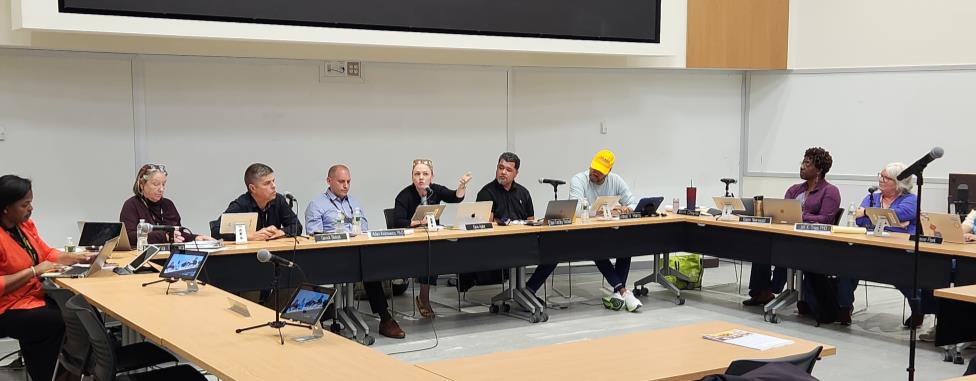
by Robert Lynch; May 16, 2024
Eldred Harris didn’t speak.
The normally loquacious Harris, a six-term member of the Ithaca Board of Education, a candidate in this year’s election, and an ardent defender of spending the money it takes to educate kids, sat surprisingly silent at the Board of Education’s Budget Hearing Tuesday. In the two-hour Board meeting that followed, Harris similarly kept to himself. Something was wrong, very wrong.
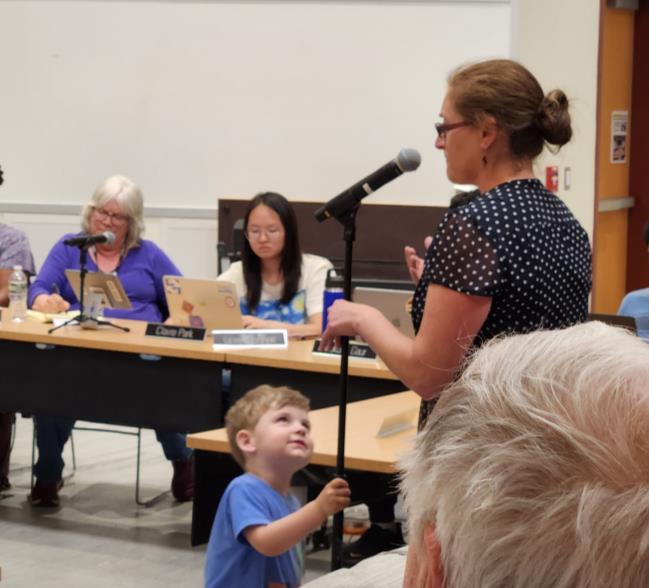
Harris and every other of the nine School Board members had gotten an earful. Most other years, the Ithaca District’s perennially reliable voters, the parents and teachers with skin in the game, leverage budget vote outcomes to suit their wants and needs. With low turnout, they approve budgets by wide margins. But this year, it may prove different.
The masses are mad. They’ve shown it. Tuesday, May 14th, they packed the stadium seating at Ithaca High School’s York Lecture Hall. Many more visited the Public Hearing online. We’re told maybe 100 attended in real time. And after each one of the 20 speakers strode to the microphone and vented his or her displeasure, most others in the room applauded. Not one of those who spoke supported the budget.
“With this budget, you have achieved a milestone,” Ronald Bourse, one of the speakers, proclaimed. “Unfortunately, that milestone is fiscal lunacy.”
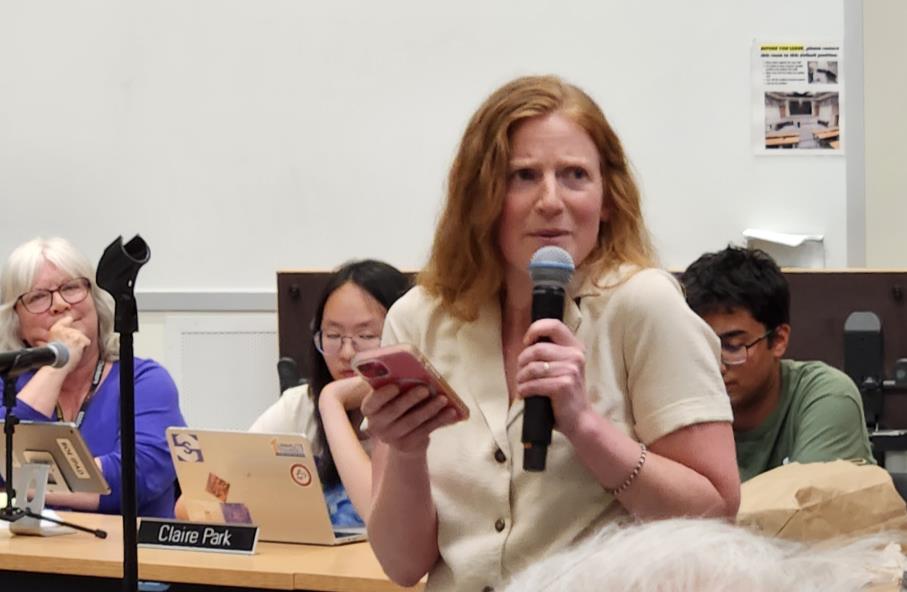
“Seems like the more money we throw at the Ithaca School District, the worse the results,” Barb Herman, another in attendance, told the Board. “It’s unrealistic to be everything to everybody, ”she said. “We can’t afford to solve national systemic problems on the backs of the few taxpayers we have in our district.”
On Tuesday, May 21st, voters in the Ithaca Schools—as well as in school districts across New York State—will decide school budgets. In Ithaca, the proposed budget totals $168.9 Million, up $10 Million, or 6.5 per cent from that of the current year. But Ithaca’s property tax levy would go up by a higher percentage. It would rise 8.4 per cent. It would have risen even more, climbed by 12.1 per cent, had not the School Board chopped $4 Million from the tax levy at a meeting in mid-April.
Ithaca’s voters will also decide next Tuesday a $125 Million capital spending option, the district’s largest-ever. The multi-year bonding authorization would underwrite construction of a new bus garage on Bostwick Road, conversion of the transportation facility to fuel electric buses, and accomplish some $85 Million in building repairs and upgrades, many of them poorly-defined so far. A third proposition would purchase four new electric buses, plus four more that use propane.
By their words, not one member of the Ithaca Board of Education predicted the referenda’s outcome. But members’ body language and their subdued demeanor spoke the words they dared not say: Chances are, the Ithaca School Board’s budget will go down to defeat. And because the budget’s proposed levy exceeds the state tax cap, the budget requires a 60 per cent majority to pass.
School Board member Jill Tripp came the closest that night to tipping her hand to the outcome. And the spectator sitting next to me in the stands that night departed the room voicing to me her assurance that Tripp would vote against the budget herself and would urge others to do likewise. Tripp didn’t really say that. But one could still infer as much from her words.
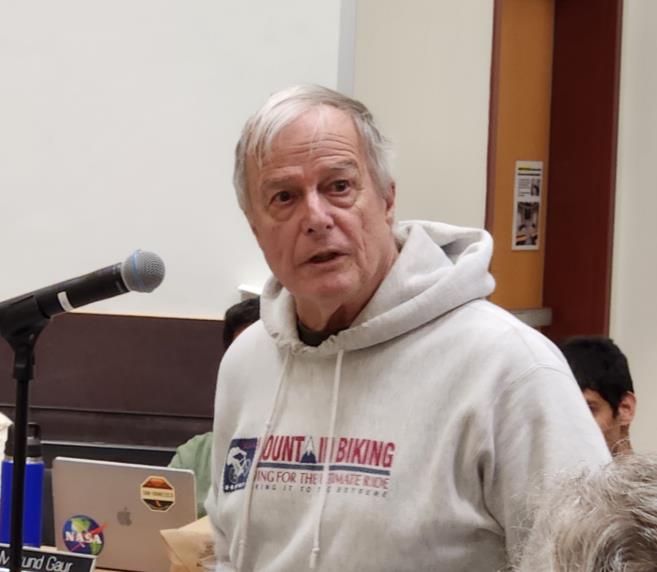
“As many of you know, I agree with much of what you said tonight,” Tripp told her Public Hearing audience. “I think if you’ll stay tuned, you’ll see some changes,” she said. “The wheels of school government move slowly, but they do move.”
Tripp said she agreed with the evening’s critics about high administrative costs, excessive spending, and the need to get Cornell University to contribute more in lieu of tax than it does. Cornell’s avarice became a frequent taxpayer complaint that night.
“You say you’d like to see the budget reworked,” Tripp told the roomful of fiscal critics. “That will happen if you vote down this budget. … May 21st will be our opportunity to know how you feel.”
A bit of background proves instructive at this point. Jill Tripp had floated a financial trial balloon at the Board’s April 16th meeting. No other member thought that night to catch it. Tripp would have cut $6 Million from the budget that School Superintendent Dr. Luvelle Brown had first offered for the Board to approve. At the time, Tripp viewed a Six Million Dollar cut as “not undoable.”
Were the current budget put before voters to fail, it’s safe to say that Tripp may place her reductions back onto the table for reconsideration. Tripp might even cut deeper. Administrators back in April had penciled-in—but nobody on the Board liked it then—a scenario that would slash spending by 20 per cent and undoubtedly cost many jobs.
With Eldred Harris keeping mum during School Board comments that followed the hearing, viewing the flip side of the financial coin was left to his colleague, Erin Croyle. Croyle was the only Board member back in April to oppose the currently-proposed budget. She viewed it as too stingy. Instead, Croyle supported Superintendent Brown’s original $171 Million budget along with its double-digit boost in the tax levy.
“I feel it deeply,” an emotional Croyle, nearly drawn to tears, acknowledged as she responded to vented taxpayer frustration. But as the parent of a deeply-disabled child mainstreamed in the Ithaca District, Croyle refused to back down from the spending levels that she believes make her school system exceptional.
“It’s not a cookie-cutter sort of district,” Croyle said. “And that’s something to be proud of.”
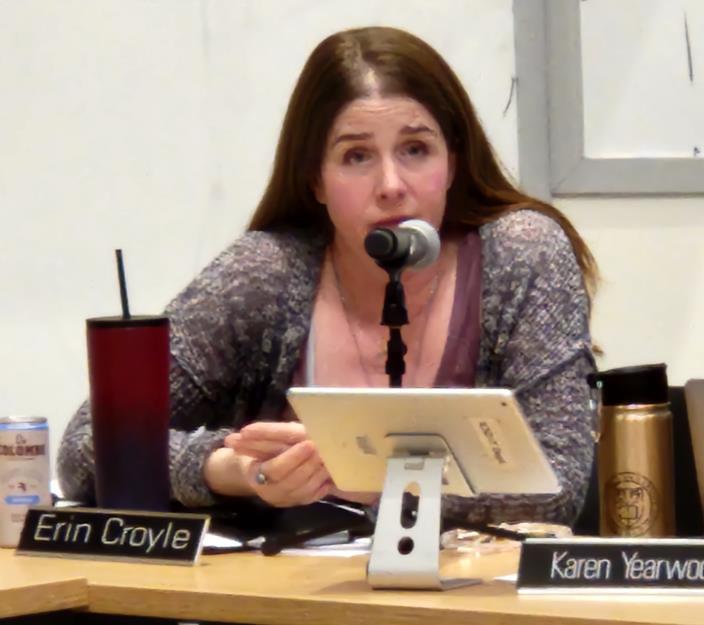
Still, some of those who spoke at the hearing might have preferred ginger snaps to any confectionaries of a more exotic flavor being served to Ithaca’s learners. It didn’t help that one day before the hearing, media reports surfaced that both Boynton and Dewitt Middle Schools—in addition to two elementary facilities—had lost “good standing” with the New York State Education Department.
The schools were cited for poor math scores and pervasive truancy. Enfield and Beverly J. Martin elementary schools lost their “good standing” status last year. For these four facilities, it becomes the equivalent of being put on academic probation.
Both of Ithaca’s middle schools having been newly-sent to the principal’s office in Albany didn’t resonate well with hearing attendees.
“How can we have the 21st highest tax levy increase out of 668 districts in the year 2023-24 and have received such a bad report card for this year?” hearing commenter Henrik Spoon asked.
“Sure would be nice if we get what we’re paying for instead of having four failing schools,” Maddie Turmato told the Board.
“If you throw money at a problem and that’s all you do, you won’t know what’s wrong when things break, and you won’t know how to fix it,” Leigh Rogers stated. “Now it’s up to us to tell the ICSD with our votes that we’re mad as hell, and we’re not going to take it anymore,” Rogers added. “Vote No and demand they do the job that we pay them for.”
“Throwing more money at a problem that is clearly not understood how to solve is a demonstration of a lack of understanding, skill and intellectual capability to do the job of administrators,” Michael Hayes said, echoing a common theme at the evening; that administrators are overpaid, yet clueless.
And commenters gave voice to the often-heard “double-standard” argument: That Ithaca schools cater to the intellectually elite more than to the rest of us.
“We are a public education system acting like a private school for Cornell-bound students,” Kay Minnick told the hearing. With taxes this high, she said, Ithaca will no longer be “multi-generational.” Instead, Minnick predicted, “It will be six-figure folks paying for children of Cornell faculty and staff to receive a private school education.”
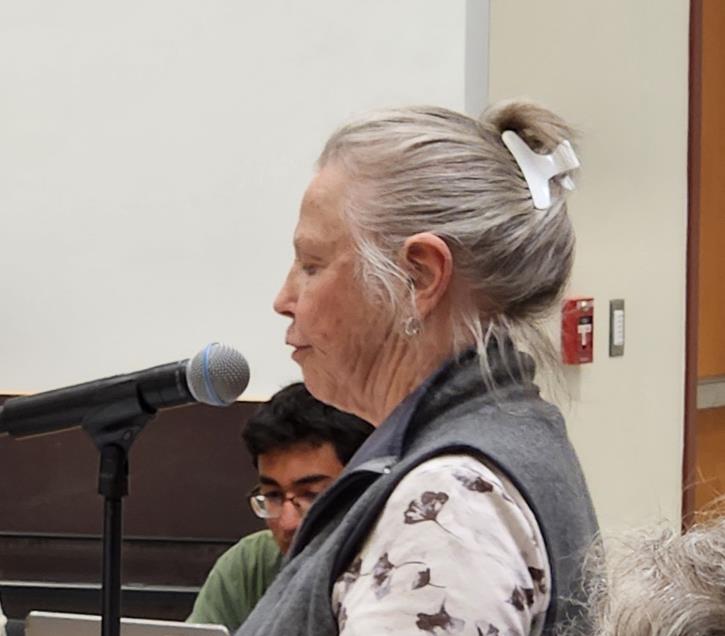
“ICSD appears to be operating a private academy under the vestiges of a public school,” Jim Mann echoed. “I cannot support this budget, and I cannot support any school board incumbent who votes for this budget,” he said.
And that’s a problem. Eight of the nine current Board members voted in favor of the budget that’s being placed before the electorate. The ninth Board member, Croyle, supported even higher spending. Three of the incumbents will seek re-election next Tuesday.
Joe Lonsky, a taxpayer-friendly candidate who’d finished in last place during the 2023 Ithaca School Board election, addressed the Public Hearing. So did Deb Justice, who brought her precocious, three-year-old son along with her. Justice calculated it’s costing her less to send him to Montessori preschool than it costs Ithaca to educate a student.
No one liked the budget. And when Board member Croyle defended the $125 Million capital bonding on grounds that New York State refunds 58 per cent of the money, a shout came from the gallery, “Who do you think the state is?”
There was one shoe that didn’t drop Tuesday night. It was a big one. And had it done so, its thud would have stolen the lead of this story. Remember what Jill Tripp had said as the hearing ended: “If you’ll stay tuned, you’ll see some changes.” Tripp assigned to her words no sell-by date. But one could infer she had implied a time-frame that’s sooner rather than later.
After the Public Hearing, but before the Board of Education held its regular business meeting, the Board entered into a closed, executive session. Board President Sean Eversley Bradwell said its topics would include the “Superintendent’s evaluation.” Eversley Bradwell predicted a 15-minute closed session. It lasted three times that long.
But during the public meeting that followed, only routine business saw action. No bombshells got dropped. Nonetheless, Superintendent Brown availed himself during his assigned speaking time to launch into a seven-minute spirited defense of his administrators, his staff, and his own leadership; as well as to address his evening’s many critics, most of whom had long-ago left the room.
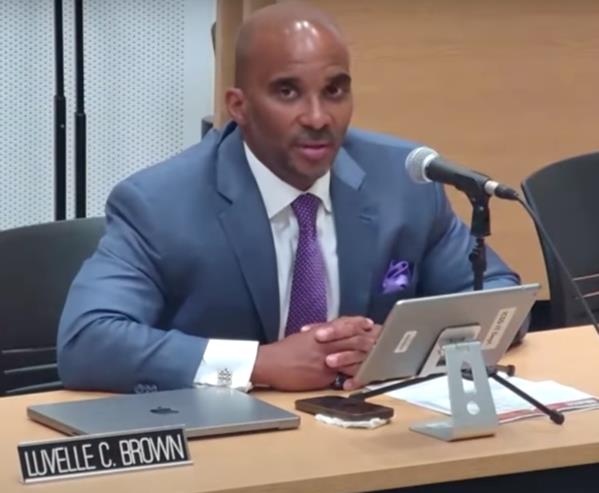
“I’m struggling with the way people can question your humanity and your professionalism without looking in your eyes and without ever having a conversation with you,” Superintendent Brown said to the Board. “And in this role I have, I know that comes with the job; the personal attacks and the questions and the challenges that comes with it, and I’m accustomed to it, and I expect it.”
Dr. Brown didn’t necessarily have to recuse himself from the Board’s head table during the Budget Hearing, but he chose to do so. The Superintendent stood at the back of the visitors’ gallery. If anyone that night wanted to attack a highly-paid administrator, Dr. Brown and his own $269,000 annual salary would stand first on their list. One speaker estimated the Superintendent earns $381,000, counting benefits.
If there is a soon-to-be-written next-chapter to the story of Dr. Brown’s leadership and tenure, it will have to wait until another meeting; a later date.
“The fact is that whatever you think about how many administrators we have, to characterize them as doing it for the money, and being lazy, and not wanting to work, I can tell you I’ve been working with this team for nine years; nothing could be farther from the truth,” Board Vice-President Moira Lang told her audience during Board member reaction to comments on the budget.
Lang got pushback. “Nobody said that,” someone shouted, referencing the accusation that administrators are lazy. Lang had to backtrack, though President Eversley Bradwell qualified that the allegation had came through emails and phone calls members had earlier received.
Lang is among those seeking re-election. She’s served three terms. The teachers’ union backs her.
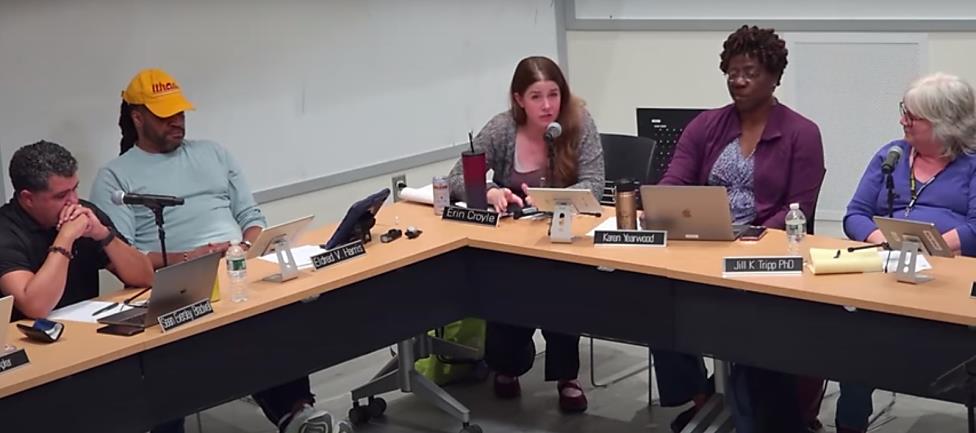
Erin Croyle’s term isn’t up this year. But among the nine who direct the course of Ithaca’s Schools, Croyle showed the most emotion. Quite transparently, hers was fueled by disappointment coupled with the fear of an electorate’s soon to be rendered verdict.
“I feel like I’m hearing the room,” Croyle said as she closed her post-hearing observations. “I’m just going to end because I don’t want to shove my foot in my mouth farther,” she acknowledged. “But I also want to thank folks that did have a little humor, because it helps for me to not cry. This is very hard.”
Erin Croyle obviously saw the political winds shifting at ICSD’s Lake Street headquarters. All the while, Eldred Harris sat at a close right-angle to her at that head table, Ithaca School District cap in place over his waist-length air… and mentioning not a word.
“I do thank you, and we do hear you,” Board President Eversley Bradwell closed the hearing. Voters weigh in next.
(Writers note: This Enfield Councilperson, clearly stating that he spoke only for himself, stood among the 20 who addressed the Ithaca Board of Education at its May 14th Public Hearing. This writer’s opinions focused on the perceived non-specificity of the $125 Million Capital Improvement Bond and his request that the District not demolish its existing Transportation Facility. These comments can be viewed and heard on the meeting video posted at the ICSD website. / RL)
***

